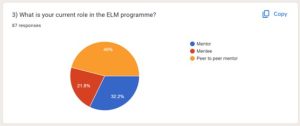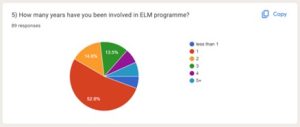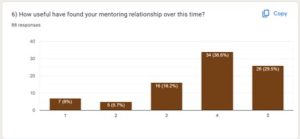Leadership Development, Coachingn and Mentoring
EARCOS Leadership and Counseling Mentoring Programmes
Evaluation
In the 2024 evaluation of the ELM and ECM the following five key benefits were evident;
- Mentorship as a Catalyst for Growth: Participants consistently found value in the guidance and advice from mentors, recognizing that the relationship helped them reflect, grow, and develop professionally, especially in leadership capacities.
- Peer Collaboration and Idea Sharing: Many participants appreciated peer-to-peer mentoring as a space to exchange ideas, share resources, and solve problems collectively, contributing to both professional and personal development.
- Cross-Context Learning: Being paired with someone from outside their own school environment, often in different roles or international contexts, offered participants new perspectives and insights, enriching their understanding of leadership in diverse educational settings.
- Building Relationships and Networks: The program facilitated meaningful connections, allowing participants to expand their professional networks, gain new perspectives, and foster relationships built on trust and mutual support.
- Reflection and Support: The mentoring process was seen as an important opportunity for participants to reflect on their practices, gain support, and have someone to serve as a sounding board for ideas, ultimately enhancing their leadership capabilities.
A sample of participant feedback on the ELM and ECM
“The feedback and perspective I receive from my mentors is invaluable. They are a sounding board for ideas, an objective and outside source of perspective, a wealth of experience, and someone who knows what it means to serve schools in leadership capacities.”
to serve schools in leadership capacities.”
“Being able to step out of your school context to discuss real issues with someone in leadership that can understand the challenges of leadership is really valuable.”
“It has been extremely useful having a thought partner, mentor, and someone who can provide advice and perspective—especially understanding a similar role in an international school context but not in my own school. I feel I have learned and grown a lot through this program.”
“I am thankful for the opportunity you are providing for us to get together with our colleagues. It is especially helpful for someone like me who is introverted, especially in large group settings like the EARCOS Leadership Conference, and find it harder to connect with people in that setting. This gives me a chance to build a meaningful and sustained professional relationship with a new colleague every year.”
“Thank you again for creating and continuing this program. It is very much appreciated. I look forward to staying connected and engaging in relevant training. I would also love to be part of developing related ideas, initiatives, or trainings.”
“Overall, this is a very useful program that offers an opportunity for growth. Thank you for all you do!”
“This is a fantastic initiative. It is a blessing to be able to formally give back to the EARCOS community.”
Current overview
The current ELM and ECM is outlined in the ELM Handbook
ELM and ECM are an opportunity for EARCOS schools to provide guided mentoring to school leaders across this network. It aims to help establish a professional relationship between experienced international administrators, heads of schools, principals, assistant principals, and other school leaders. (e.g. curriculum coordinators, professional development, human resource, finance directors, etc.)
network. It aims to help establish a professional relationship between experienced international administrators, heads of schools, principals, assistant principals, and other school leaders. (e.g. curriculum coordinators, professional development, human resource, finance directors, etc.)
The EARCOS Leadership Mentoring initiative pairs of dynamic international school leaders in order to build a positive, trusting relationship that:
- creates genuine collaborations in order to promote learning,
- builds mutual benefit and enduring professional growth partnerships,
- provides a deliberate and reliable program of support, and
- enhances wellbeing by breaking isolation barriers.
The mentoring process involves conversations which use listening, questioning and feedback to raise performance and increase confidence of the mentee. This relationship is carefully negotiated to include a mentoring agreement with clearly defined goals, prescribed time commitments, and norms of conduct, including confidentiality.
The ELM is not intended to take the place of mentorship programs already organized in member schools or by other networks and associations.
Those interested in being involved in the program as mentors or mentees are invited to read the ELM manual and then complete the registration and preference ELM questionnaire or ECM questionaire. This questionnaire for both mentors and mentees collects some demographic information to assist with the matching process. It also asks each leader their reasons for getting involved in ELM and any pairing preferences they might have including gender, experience, location, peer to peer or more experienced mentor, etc. These expressions of interest will then be collated, approved and applicants matched. Both parties will then be notified and asked to sign the ELM Mentoring Contract and the ELM Norms of Behaviour including their commitment with respect to time, confidentiality, and opt-out mechanism.
Mentoring will then commence with an initial conversation between mentor and mentee to negotiate the ELM Mentoring agreement after which mentoring will occur approximately once a month, or on a schedule that is mutually agreeable to both parties.
At the EARCOS Leadership Conference each year an opportunity is provided for mentors and mentees to meet and have a face-to-face mentoring session. They will also meet all the other leaders in the ELM network and receive training on mentoring frameworks and models as well as share learning and impact with each other.
Leadership Development, Coachingn and Mentoring
EARCOS Leadership and Counseling Mentoring Programmes
Evaluation
In the 2024 evaluation of the ELM and ECM the following five key benefits were evident;
- Mentorship as a Catalyst for Growth: Participants consistently found value in the guidance and advice from mentors, recognizing that the relationship helped them reflect, grow, and develop professionally, especially in leadership capacities.
- Peer Collaboration and Idea Sharing: Many participants appreciated peer-to-peer mentoring as a space to exchange ideas, share resources, and solve problems collectively, contributing to both professional and personal development.
- Cross-Context Learning: Being paired with someone from outside their own school environment, often in different roles or international contexts, offered participants new perspectives and insights, enriching their understanding of leadership in diverse educational settings.
- Building Relationships and Networks: The program facilitated meaningful connections, allowing participants to expand their professional networks, gain new perspectives, and foster relationships built on trust and mutual support.
- Reflection and Support: The mentoring process was seen as an important opportunity for participants to reflect on their practices, gain support, and have someone to serve as a sounding board for ideas, ultimately enhancing their leadership capabilities.
A sample of participant feedback on the ELM and ECM
“The feedback and perspective I receive from my mentors is invaluable. They are a sounding board for ideas, an objective and outside source of perspective, a wealth of experience, and someone who knows what it means to serve schools in leadership capacities.”
to serve schools in leadership capacities.”
“Being able to step out of your school context to discuss real issues with someone in leadership that can understand the challenges of leadership is really valuable.”
“It has been extremely useful having a thought partner, mentor, and someone who can provide advice and perspective—especially understanding a similar role in an international school context but not in my own school. I feel I have learned and grown a lot through this program.”
“I am thankful for the opportunity you are providing for us to get together with our colleagues. It is especially helpful for someone like me who is introverted, especially in large group settings like the EARCOS Leadership Conference, and find it harder to connect with people in that setting. This gives me a chance to build a meaningful and sustained professional relationship with a new colleague every year.”
“Thank you again for creating and continuing this program. It is very much appreciated. I look forward to staying connected and engaging in relevant training. I would also love to be part of developing related ideas, initiatives, or trainings.”
“Overall, this is a very useful program that offers an opportunity for growth. Thank you for all you do!”
“This is a fantastic initiative. It is a blessing to be able to formally give back to the EARCOS community.”
Current overview
The current ELM and ECM is outlined in the ELM Handbook
ELM and ECM are an opportunity for EARCOS schools to provide guided mentoring to school leaders across this network. It aims to help establish a professional relationship between experienced international administrators, heads of schools, principals, assistant principals, and other school leaders. (e.g. curriculum coordinators, professional development, human resource, finance directors, etc.)
network. It aims to help establish a professional relationship between experienced international administrators, heads of schools, principals, assistant principals, and other school leaders. (e.g. curriculum coordinators, professional development, human resource, finance directors, etc.)
The EARCOS Leadership Mentoring initiative pairs of dynamic international school leaders in order to build a positive, trusting relationship that:
- creates genuine collaborations in order to promote learning,
- builds mutual benefit and enduring professional growth partnerships,
- provides a deliberate and reliable program of support, and
- enhances wellbeing by breaking isolation barriers.
The mentoring process involves conversations which use listening, questioning and feedback to raise performance and increase confidence of the mentee. This relationship is carefully negotiated to include a mentoring agreement with clearly defined goals, prescribed time commitments, and norms of conduct, including confidentiality.
The ELM is not intended to take the place of mentorship programs already organized in member schools or by other networks and associations.
Those interested in being involved in the program as mentors or mentees are invited to read the ELM manual and then complete the registration and preference ELM questionnaire or ECM questionaire. This questionnaire for both mentors and mentees collects some demographic information to assist with the matching process. It also asks each leader their reasons for getting involved in ELM and any pairing preferences they might have including gender, experience, location, peer to peer or more experienced mentor, etc. These expressions of interest will then be collated, approved and applicants matched. Both parties will then be notified and asked to sign the ELM Mentoring Contract and the ELM Norms of Behaviour including their commitment with respect to time, confidentiality, and opt-out mechanism.
Mentoring will then commence with an initial conversation between mentor and mentee to negotiate the ELM Mentoring agreement after which mentoring will occur approximately once a month, or on a schedule that is mutually agreeable to both parties.
At the EARCOS Leadership Conference each year an opportunity is provided for mentors and mentees to meet and have a face-to-face mentoring session. They will also meet all the other leaders in the ELM network and receive training on mentoring frameworks and models as well as share learning and impact with each other.




